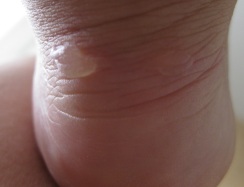Every Wednesday, I explore the linguistic origins of the same word in different languages.
It’s safe to say that spring has definitely arrived in la petite couronne. It’s not just that I closed out the Winter playlist, nor that the sun came out. It’s not even that the constant rain of the last season let up. The real sign came when I went out for a bit and, deciding that the day was much too nice to keep to my arranged schedule, I spent the whole afternoon walking around. As I hadn’t been planning on being so active, I hadn’t dressed accordingly which meant that a big blister formed on the ball of my foot. Skin soft and weak from months of being coddled needs to learn fast that the times, they have a’ changed.
EN → blister — a small bubble on the skin filled with serum and caused by friction, burning, or other damage. ORIGIN Middle English, perhaps from Old French blestre [swelling, pimple].
ES → ampolla — Elevación local de la epidermis por acumulación de fluido. [Raised area on the skin which has risen in response to being filled with fluid.] ORIGIN Latin ampulla [small accident, round jug with two handles].
FR → cloque — Petit gonflement de la peau produit par une brûlure, une piqûre, un frottement. [Small swelling of the skin produced by a burn, a bite or friction.] ORIGIN Permutation of cloche [bell] in the Normand and Picard dialects where the Latin sound /k/ hasn’t been transformed into /ʃ/ [“sh”].
FYI: do not do an image search for “blister.” There is some nasty stuff out there.
English note: the dictionary said “perhaps,” but if there’s an old word blestre that means swelling, it seems like a pretty good bet to me.
French note: Blisters are also called ampoules in French, but I already wrote about them once, so I went with this version. In both cases, the word is used to refer to a thing that contains or is filled with liquid. Interestingly, ampoules are also light bulbs but this seems like a case of “one of these things is not like the others.”
French note 2: I like this definition best. It’s precise and lovely.
Today’s winner is English since it’s a dedicated word.
* My first blister from 2014 will be used to illustrate another post. Don’t all get too excited at once. That one’ll be a bit gross for people who are sensitive to such things but awesomely informative to those who like practical knowledge.

